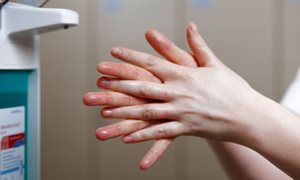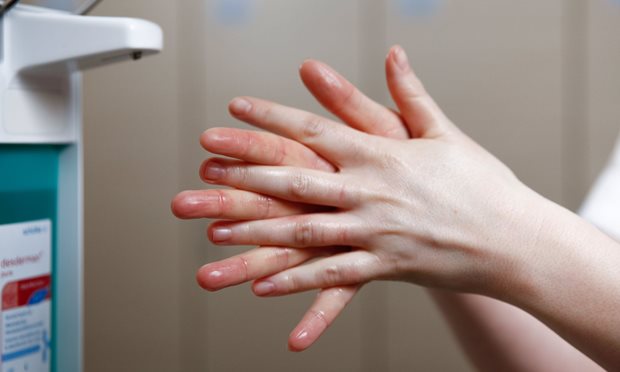

About infection prevention
As a student in the field of Medicine, Dentistry, Dental Hygiene or Biomedical Sciences, you come into contact with patients and patient material. During this contact, you can be exposed to bacteria and viruses. read moreAbout infection prevention
As a student in the field of Medicine, Dentistry, Dental Hygiene or Biomedical Sciences, you come into contact with patients and patient material. During this contact, you can be exposed to bacteria and viruses. This entails the risk of getting an infection. Besides, you could spread infections among colleagues or patients. To avoid exposure and/or spreading, it is important that you are well aware of your being at risk and the possible measures you can take.Learn more or make an appointment?
Call the Occupational Health & Safety and Environmental Service (AMD) at +31 (0)24 361 54 00 or fill in the form.Basic precautions
In many cases, infection can be prevented if one complies with the basic precautions with respect to:- hand hygiene
- personal hygiene
- dress codes
- personal protection equipment
- save handling of (possibly) infectious materials
How to avoid spread among patients and/or colleagues?
Do you suffer an infection? Or did you have unprotected contact with MRSA or TBC? Please report this to your supervisor and to the Occupational Health & Safety and Environmental Service (AMD). read moreHow to avoid spread among patients and/or colleagues?
Do you suffer an infection? Or did you have unprotected contact with MRSA or TBC? Please report this to your supervisor and to the Occupational Health & Safety and Environmental Service (AMD) and work out together what action has to be taken to avoid spreading.When you come into direct contact with patients, make sure you have a flu and/or pneumonia vaccination every year.
Also see:
How to protect yourself?
Keep to the hygiene rules. read more on QportalScreening infectious diseases
During your studies, you will be screened by the Occupational Health & Safety and Environmental Service (AMD), for infectious diseases relevant in your field of study. read moreScreening infectious diseases
During your studies, you will be screened by the Occupational Health & Safety and Environmental Service (AMD), for infectious diseases relevant in your field of study. You will be informed about this timely and the necessary appointments will be available in your timetable.The Occupational Health & Safety and Environmental Service (AMD) will let you know if and for what you should visit.

Accidental skin puncture what to do?
If you are affected by a needle stick injury, it is important to take immediate action. For details, see the Radboudumc protocol for needle stick injuries (or the protocol of the institution where you are an intern at the moment). read more on Qportal
Going abroad what should you pay attention to?
It is very likely that you will go abroad at some point during your studies, for an internship for instance, or on vacation. This may entail health risks. read moreGoing abroad what should you pay attention to?
It is very likely that you will go abroad sometime during your studies, for an internship for instance, or on vacation. This may entail health risks. Please seek some expert advice. Also, pay special attention to HIV (PEP-profylaxe) precautions.www.radboudtravelclinic.nl
www.niih.nl
Have you been working abroad or have you been hospitalized in a foreign hospital? Then you might need an MRSA and/or TBC-screening. Please contact the Occupational Health & Safety and Environmental Service (AMD) for further details.
Learn more on Qportal: staff member infection report
